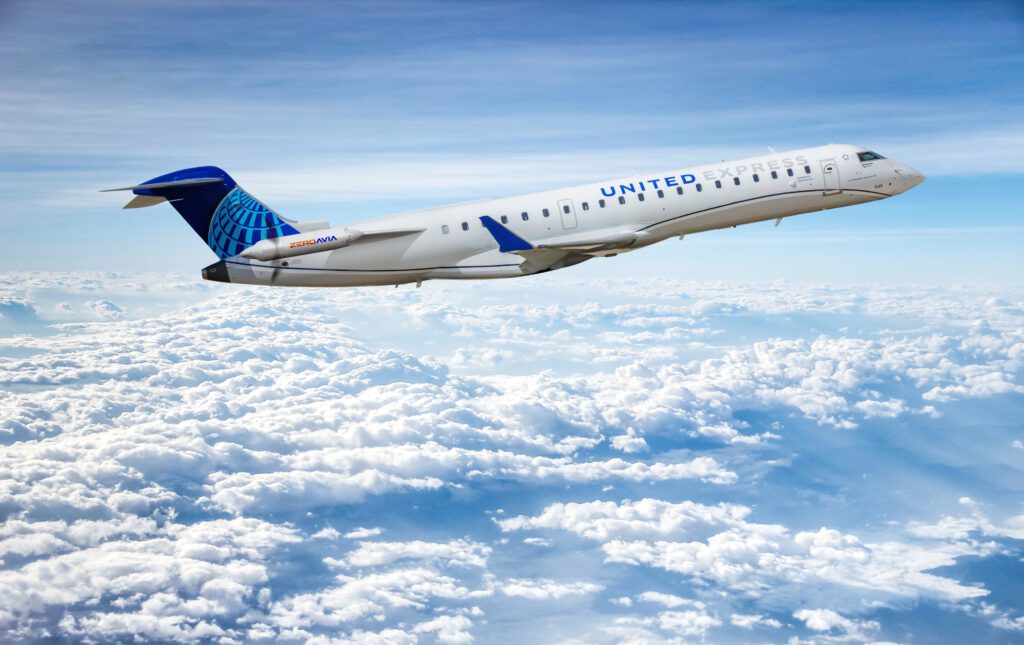
ZeroAvia receives $35 million in its latest round of investments for developing its 100% hydrogen-electric engines.
United Airlines announced an investment this week in ZeroAvia’s hydrogen-electric engines. ZeroAvia has secured $35 million in this latest round of investments from both United and Alaska Air Group. The total amount of investments in ZeroAvia is now $115 million and includes previous investors AP Ventures, Horizons Ventures, Shell Ventures, Breakthrough Energy Ventures, Summa Equity, and Amazon’s Climate Pledge Fund.
ZeroAvia’s agreement with United includes the ability to purchase up to 100 of ZeroAvia’s engines. The 100% hydrogen-electric engines may be integrated into United Express aircraft in 2028. United is currently the largest airline to have committed to hydrogen-electric aviation. CEO Scott Kirby stated in a press release, “Hydrogen-electric engines are one of the most promising paths to zero-emission air travel for smaller aircraft, and this investment will keep United out in front on this important emerging technology.”
ZeroAvia’s new raise of $35 million will aid the development of its 2–5MW zero-emission powertrain system and will allow the company to expand its locations across the US, UK, and continental Europe. Val Miftakhov, CEO and founder of ZeroAvia, said, “As we prepare for ground and flight testing of our first commercial intent product in the coming weeks, this backing by our investors will enable us to accelerate delivery of our engine for larger aircraft.”
When the partnership between ZeroAvia and Alaska Air Group was announced just two months ago, Miftakhov commented, “The aviation industry is one of the hardest industries to decarbonize; however, with this collaboration, we are one step closer to achieving our goal of making our skies emission-free.” The engineering team from Alaska Air Group, the parent company of Alaska Airlines, is working with ZeroAvia’s team on the “ZA2000,” a scaled version of their existing hydrogen-electric powertrain, to be retrofitted on a De Havilland Q400 with 76 seats.

ZeroAvia’s powertrain repowers existing airframe models.
In an interview over email with Avionics International, a representative from ZeroAvia explained in greater detail how their powertrain system which will replace conventional propulsion systems. “Fuel cells use hydrogen from the onboard storage tanks and oxygen from the ambient air in a catalytic chemical reaction that produces electricity. The fuel cell system provides power to the electric motors, which propel the aircraft.”
Fuel cells provide 60% or higher efficiency in comparison with internal combustion efficiency, which is up to 30% in small engines and at most 50% in large engines. The company’s main target market is regional commercial travel. ZeroAvia’s representative remarked, “We believe that this market has the most potential to benefit from our zero-emission technology.” However, there may be applications for agricultural use of their engines in the future.
ZeroAvia has achieved recognition for having flown the largest hydrogen-electric aircraft to date—a six-seater aircraft. The team has also performed 35 flight tests and is now preparing for ground and flight testing of the ZA600 powertrain, which will be used in a Dornier 228 19-seat aircraft, according to the representative.
The company is working towards several goals in pursuit of beginning commercial operations in 2024. In the coming weeks, the team will complete the first test flights from the UK as part of the HyFlyer II project, including a 300-mile hydrogen-electric flight in a 19-seat aircraft. After that, said the representative, “We will work towards certification of the powertrain to ensure that it is ready for adoption in 2024.”
In September 2020—during the first iteration of the HyFlyer project in Cranfield, England—ZeroAvia achieved the world’s first hydrogen fuel cell powered flight of a commercial-grade aircraft. The company now aims to launch, in 2024, the first hydrogen-electric commercial route from London to Rotterdam airport using the ZA600 powertrain to enable zero-emission propulsion for a 19-seat aircraft.